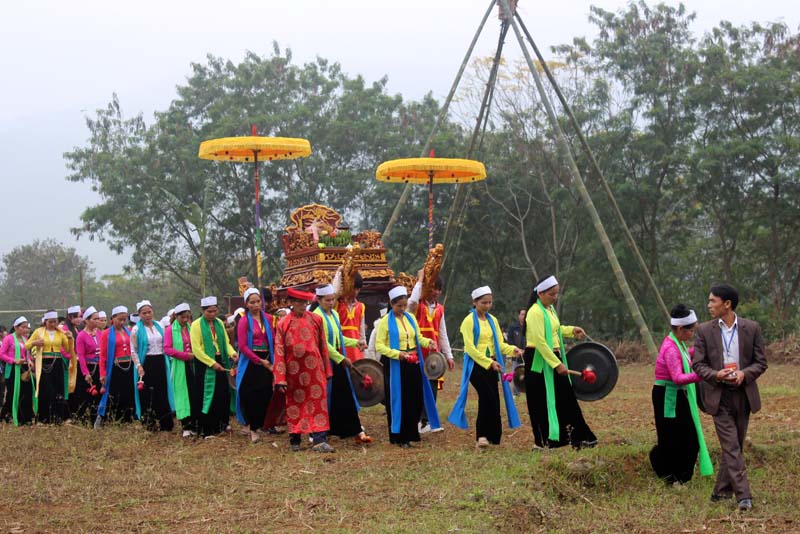



People in Vinh Dong commune (Kim Boi district) attend the annual Muong Chanh Festival.
That uniqueness can be seen in festivals of local ethnic minorities. Every spring, people from across Vietnam flock to festivals imbued with cultural identities of ethnic groups in Hoa Binh such as the going-to-the-field and fishing festivals of the Muong people, the cap sac (maturity) ritual of the Dao quan chet people, the Xen ban and Xen Muong festival of the Thai people, and the Gau Tao festival of the Mong people.
Festivals are popular community cultural activities and also priceless intangible cultural heritage enriching the national culture. A number of festivals used to be lost for many years have now been restored, including the Coi Communal House Festival in Binh Chan commune (Lac Son district), the Vai Communal House Festival in Thanh Nong commune (Lac Thuy district), the Trung Bao Temple and Shrine Festival in Cao Thang commune (Luong Son district), the Xam Communal House Festival in Phu Lai commune (Yen Thuy district), Hang Pagoda Festival in Yen Tri commune (Yen Thuy), the Tien Pagoda Festival in Phu Lao commune (Lac Thuy), the Rem Temple Festival in Chi Ne township (Lac Thuy), and the Ngoi Communal House Festival in Su Ngoi commune (Hoa Binh city).
According to the provincial Department of Culture, Sports and Tourism, more than 60 festivals have been held in Hoa Binh in 2019. They included six district-level events, namely the inauguration of the memorial house of revolution contributors and the tree planting festival at the Chi Ne farm-based banknote printing factory relic site, the Tien Pagoda Festival (Lac Thuy), Muong Dong Festival (Kim Boi), Truong Kha Temple Festival (Lac Son), the culture – sports spring festival of Ky Son district, and the festivals of the Dao people (Da Bac district). Additionally, there are 35 others at the communal level and 22 festivals at hamlets.
The Hoa Binh Culture – Tourism Week 2019 was the biggest of its kind held so far in the province. A wide range of activities took place during the five days of the event, including arts, photo and culinary festivals, an exhibition of outstanding intangible cultural heritage of local ethnic groups, a beauty pageant and a workshop on local tourism development. All the activities were meant to popularise Hoa Binh as the place that gathers the most unique cultural identities./.